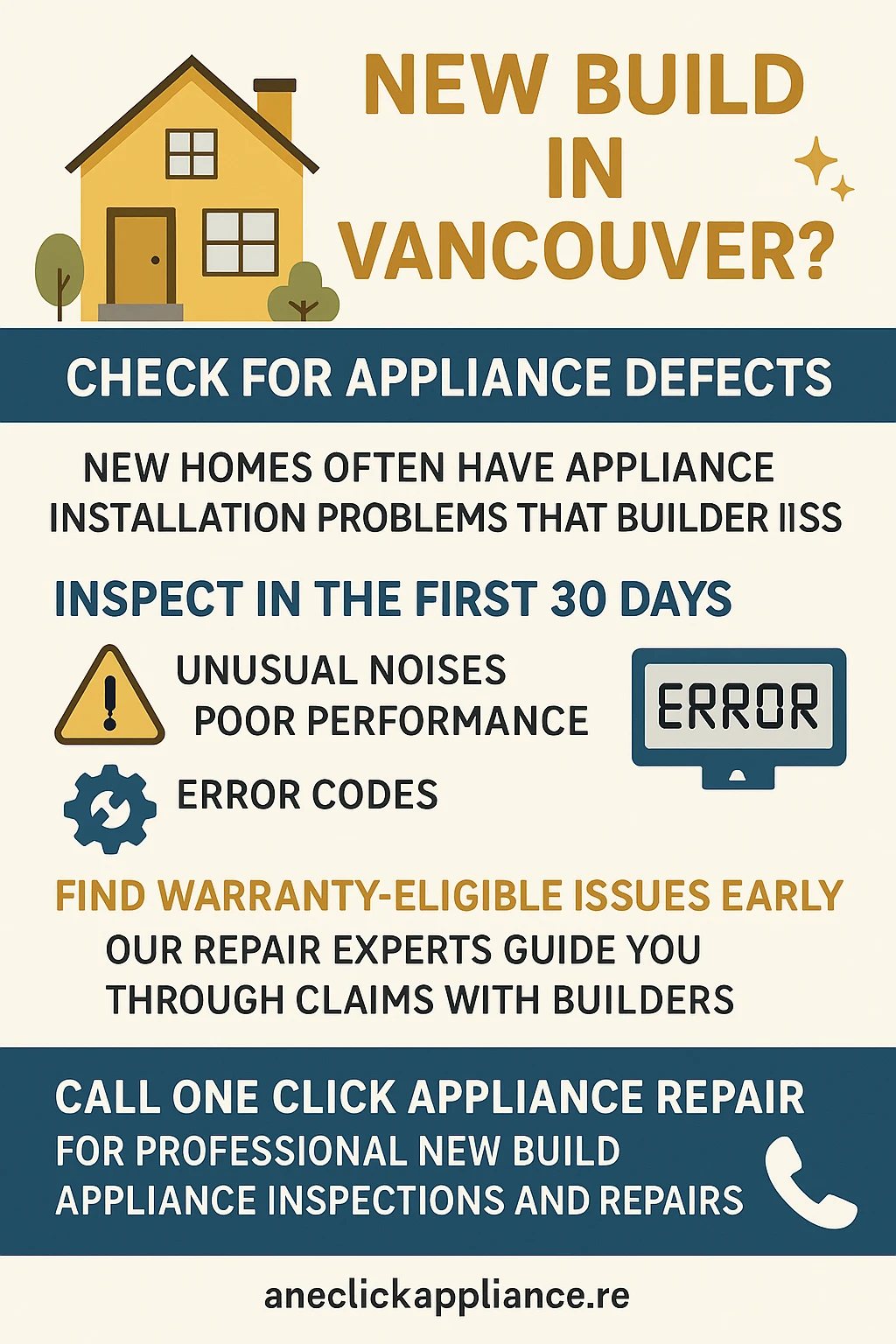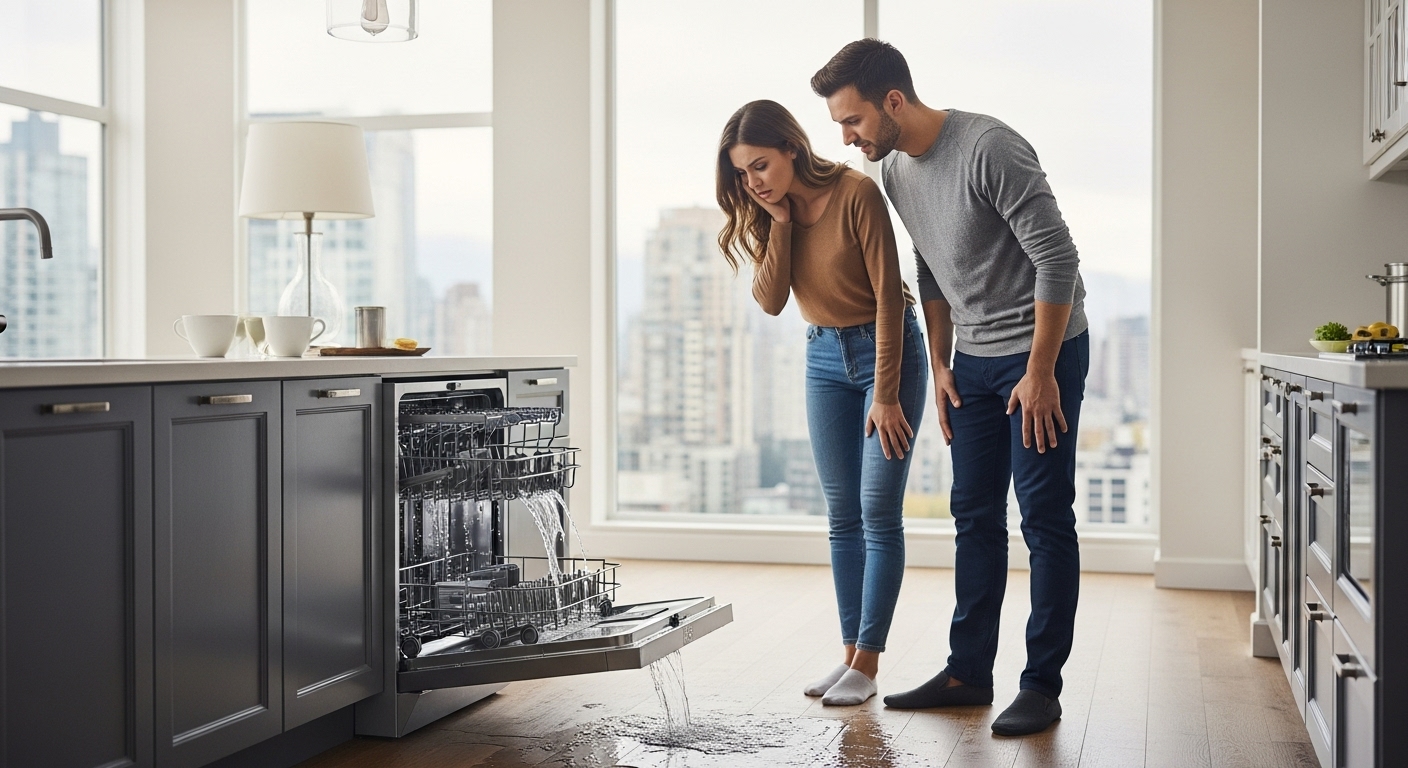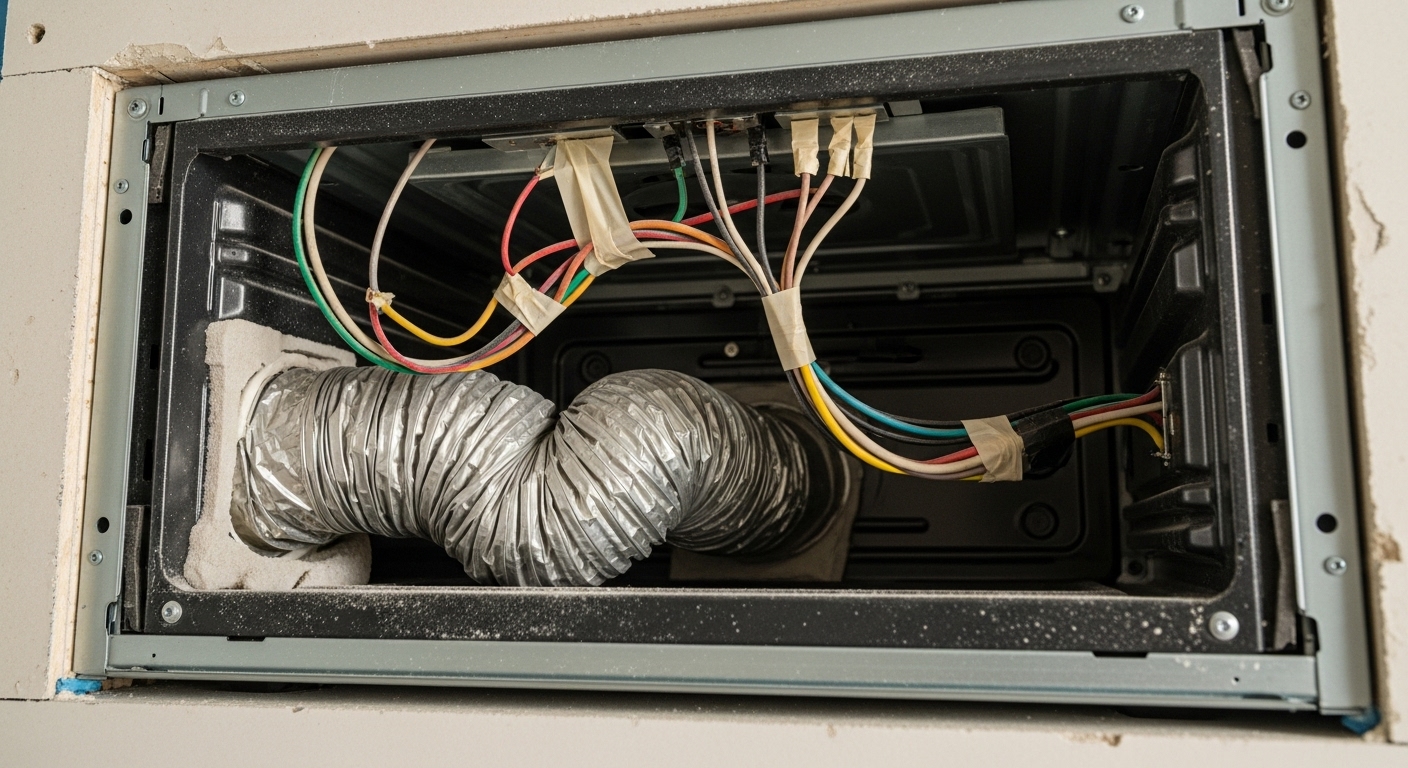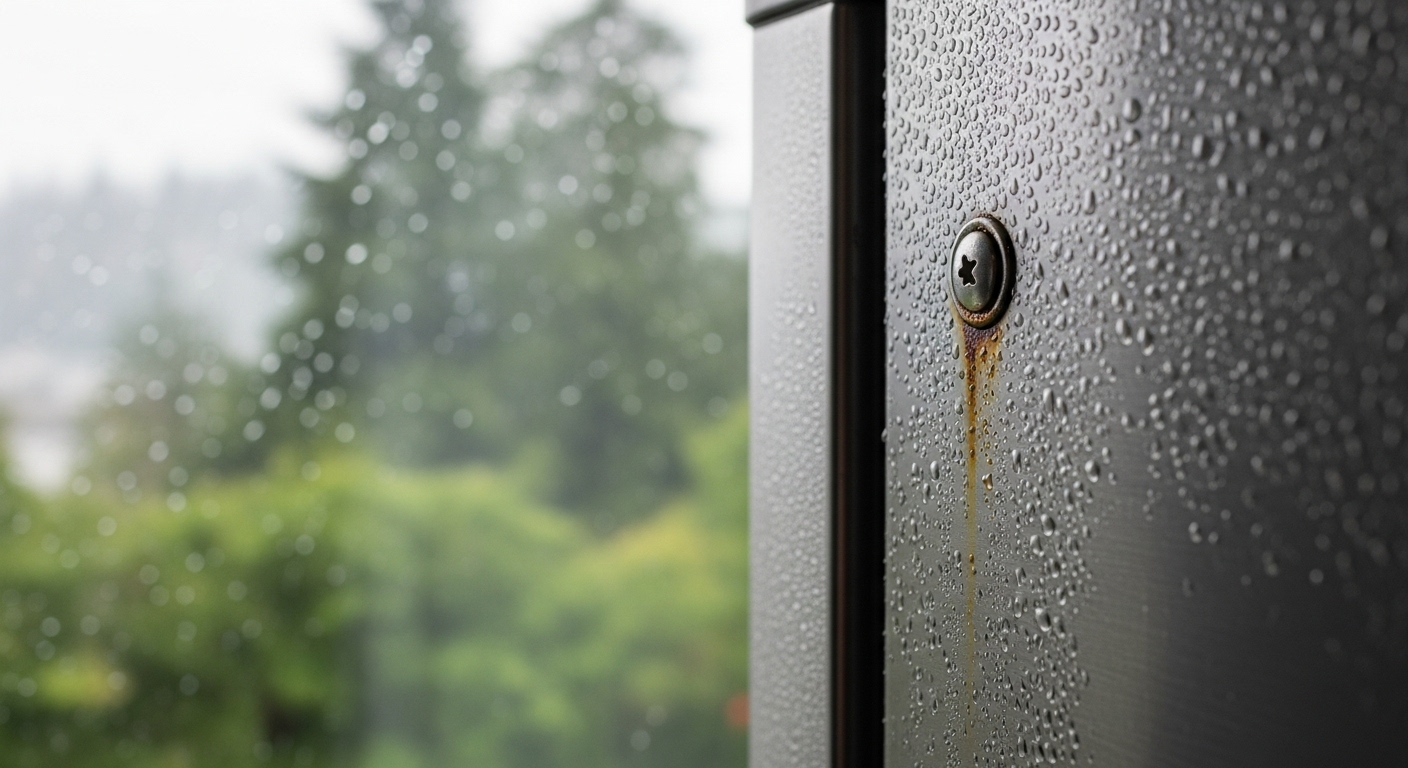Vancouver New Build Appliance Problems: Why Brand New Homes Have Hidden Appliance Issues (And How to Spot Them Before Your Warranty Expires)
Bought a gorgeous new Vancouver home only to discover your supposedly pristine appliances are failing left and right just months after moving in? You’re not alone – new build appliance problems plague thousands of Vancouver homeowners, and the hidden issues often don’t surface until after your strongest warranty protections expire.
Picture this: you’ve just dropped half a million on that shiny new Burnaby townhouse, complete with stainless steel appliances that scream “luxury living.” Three months later, your dishwasher is leaving spots on everything, your fridge’s ice maker sounds like a construction site, and that fancy induction cooktop? It’s throwing error codes like confetti. Suddenly, your dream home feels more like an expensive nightmare, and you’re wondering how brand-new appliances can have so many problems.
Here’s the thing that most Vancouver homeowners don’t realize: new build appliances actually fail at higher rates than appliances installed in existing homes. Between rushed installation timelines, Vancouver’s brutal coastal climate, and the chaos of coordinating multiple construction trades, your “new” appliances have often endured more stress before you even get your keys than most appliances face in their first year of normal use. The worst part? Many of these problems are completely preventable with proper inspection and early intervention.
As someone who’s helped countless Vancouver families navigate these frustrating situations, I can tell you that understanding what to look for and when to act can save you thousands in out-of-pocket repair costs. The key is knowing that your warranty clock is already ticking, and those first 30 days after possession are absolutely critical for protecting your investment.
Key Outtakes:
- Installation errors cause more warranty voidances than actual product defects in Vancouver’s new builds, with improper electrical connections and inadequate ventilation being the top culprits
- Vancouver’s coastal climate accelerates appliance wear by up to 30%, particularly affecting new builds with inadequate ventilation systems during the construction phase
- Poor coordination between construction trades leads to appliance damage during final build phases, with appliances often exposed to dust, moisture, and handling damage weeks before homeowner possession
- Professional appliance inspection within 30 days of possession can catch warranty-voiding issues before coverage expires, potentially saving thousands in future repair costs
- Developer-grade appliances often lack features and durability of identical-looking retail models, despite appearing premium to unsuspecting buyers

Why New Build Appliances Fail More Than Expected

The construction industry’s dirty little secret is that appliance installation often gets treated as an afterthought rather than the precision process it actually needs to be. When builders are racing to meet possession dates and deal with Vancouver’s notoriously tight construction schedules, appliance installation frequently gets squeezed into the final chaotic weeks of construction. This creates a perfect storm where corners get cut, proper procedures get skipped, and quality control takes a backseat to simply getting the job done.
What makes this situation even more problematic is that many new build appliances aren’t actually the same models you’d buy at retail. Developers often purchase stripped-down “builder-grade” versions of popular appliance models that look identical from the outside but lack key features and components that affect durability and performance. These developer-grade appliances might have cheaper internal components, fewer sensors, or simplified control systems that make them more prone to early failure.
The storage and handling process during construction adds another layer of risk that most homeowners never consider. Your “new” appliances might have been delivered to the construction site weeks or even months before installation, sitting in basements or garages exposed to construction dust, moisture fluctuations, and potential damage from other trades working around them. I’ve seen refrigerators with dents from electrical conduit installations and dishwashers with damaged door seals from contractors using them as makeshift workbenches.
Vancouver’s construction boom has also created a shortage of qualified appliance installers, meaning that general contractors or handypeople often handle installations that really require specialized knowledge. These well-meaning but under-qualified installers might not understand the specific requirements for warranty compliance, Vancouver’s unique building codes, or the proper procedures for testing and commissioning new appliances.
The timeline pressure in new construction means that appliances rarely get the thorough testing and break-in period they need. While you might spend an hour testing every function when you buy a new appliance for your existing home, construction crews typically do nothing more than a basic power-on test before calling the installation complete. This means that problems with ice makers, dishwasher cleaning cycles, or oven temperature calibration won’t be discovered until you’re living in the home and depending on these appliances daily.
Installation Mistakes That Void Warranties in New Construction

The warranty minefield surrounding new build appliances is more treacherous than most homeowners realize, and installation errors are the biggest threat to your coverage. Unlike mechanical failures that are clearly covered under standard warranties, installation problems create gray areas where manufacturers can deny claims and leave you holding the repair bill. Understanding these common installation mistakes can help you spot problems before they become expensive headaches.
Electrical connection errors top the list of warranty-voiding problems in Vancouver new builds. Many contractors focus on getting appliances powered up without paying attention to the specific electrical requirements that manufacturers demand for warranty coverage. This might mean using the wrong type of circuit breaker, inadequate wire gauges, or failing to provide proper GFCI protection where required by Vancouver’s electrical codes. A recent analysis of warranty claim denials found that improper electrical connections account for nearly 40% of rejected warranty claims in the Vancouver area.
Ventilation problems create the second-most common category of warranty issues, particularly for ranges, dryers, and dishwashers. Vancouver’s building codes have specific requirements for appliance ventilation that differ from many manufacturers’ minimum specifications, and installation crews sometimes split the difference in ways that satisfy neither standard. Poor ventilation doesn’t just affect performance – it can cause overheating, condensation damage, and premature component failure that manufacturers will blame on improper installation.
Water supply and drainage connections present another major warranty risk, especially in Vancouver’s older neighborhoods where water pressure and quality can vary significantly. Dishwashers and ice makers are particularly sensitive to water conditions, and failure to install proper filtration or pressure regulation can void warranties even if the appliances initially appear to work correctly. The gradual mineral buildup from Vancouver’s moderately hard water can cause component failures that manufacturers attribute to inadequate water treatment.
Documentation gaps also contribute to warranty problems in new builds. Professional appliance installers typically provide detailed documentation of installation procedures, test results, and compliance certifications. Construction crews rarely maintain this level of documentation, making it difficult to prove proper installation when warranty claims arise. Without proper documentation, manufacturers often default to denying claims rather than assuming liability for potentially improper installation.
The coordination between different building systems creates additional warranty risks that are unique to new construction. For example, HVAC systems that aren’t properly balanced can create pressure differentials that affect appliance ventilation, while plumbing systems that haven’t been properly flushed can introduce debris that damages appliance components. These system-level interactions are rarely considered during appliance installation but can cause problems that surface months later.
Vancouver’s Climate Impact on New Build Appliances

Vancouver’s coastal environment creates a unique set of challenges for appliances that many homeowners and even contractors don’t fully appreciate. The combination of high humidity, salt air, and temperature fluctuations puts stress on appliance components in ways that don’t affect homes in drier inland climates. New build appliances are particularly vulnerable because they haven’t been gradually conditioned to local environmental conditions and often lack the protective measures that experienced Vancouver homeowners learn to implement.
Humidity control during the construction process is frequently inadequate, meaning that appliances may be exposed to moisture levels well above normal operating conditions for weeks or months before homeowner possession. This exposure can cause corrosion in electrical components, mold growth in ventilation systems, and seal deterioration that won’t become apparent until the appliances are in regular use. The problem is compounded by Vancouver’s construction season, when homes are often enclosed during the wettest months of the year without adequate dehumidification.
Salt air penetration affects all Vancouver neighborhoods, not just waterfront properties, and creates mineral buildup that clogs filters, corrodes metal components, and interferes with electronic sensors. New buil



